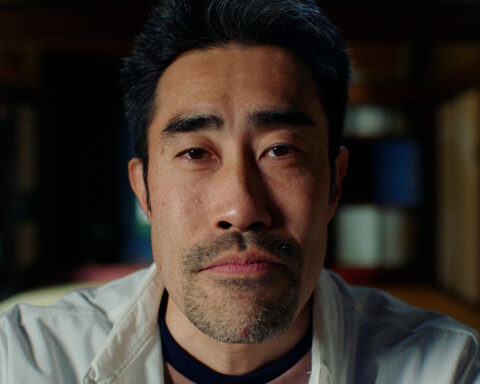One of Us
(USA, 95 min.)
Dir. Rachel Grady and Heidi Ewing
Programme: TIFF Docs (World Premiere)
TIFF Docs programmer Thom Powers calls One of Us a “documentary thriller” in his programme notes for the film. The description couldn’t be more appropriate. This suspenseful, gripping, and incendiary film by Rachel Grady and Heidi Ewing (Detropia, Jesus Camp) pulses with urgency as it chronicles the plight of three New Yorkers. The trio of subjects are individuals trying to extricate themselves from the suffocating insularity of the city’s Hasidic community. The need to escape is immediately palpable in this riveting film that is shot and paced to convey the tensions of a Hollywood white-knuckler, but the suspense can be overwhelming when one realizes that the stakes are real.
Etty, a woman in her early thirties, describes being married at the age of 19 for a life that stripped her of opportunities and agency. She describes a repressed life spent birthing child after child, essentially serving little function other than being a uterus as she delivered her seventh baby before she was 30. Etty loves her children, though, and the interviews that Grady and Ewing get with the subject show an earnest and anxious desire to save her children from the life she knows awaits them if she raises them under Hasidism.
Luzer, an actor in his late 20s, tells about leaving his wife and children to pursue his dream of being an actor. When movies and television aren’t permitted in Hasidism, his flight reveals the extent to which people live double lives and assume the burden of acting out their desires in secret for fear of being caught. The film shows seven years’ worth of footage of Luzer documenting his path to a free life as a creative, cornering the market for Jewish and Hasidic characters after discovering the wonders of the Internet. (As a side note of Twersky’s success, his work as an actor includes the Canadian drama Felix & Meira, which won Best Canadian Feature at TIFF and was our 2015 Oscar submission for Best Foreign Language Film.)
Ari, 18, is a victim of sexual abuse. He struggles with addiction by consequence and seeks rehabilitation, which includes saving himself from the lifestyle he uses drugs to escape. His childhood trauma speaks to the deeply rooted institutional conservatism in Hasidism since his abuse at summer camp is overlooked by elders with paltry excuses (“He fell on you!”) that perpetuate the status quo.
The notion of “status quo” becomes significant in One of Us as Grady and Ewing introduce a legal standard that institutionalizes the repressive norms of the Hasidic community. Fear and alienation become unbearable as the three subjects literally risk every aspect of their lives in order to escape. What the filmmakers uncover is a community of unilateral control.
Pro-Trump signs and news snippets situate the plights of the characters with America’s own return to a conservative regime dominated by a subcultural fight for survival. While Trump’s Presidency is white supremacy’s last stand, One of Us reminds audiences that Hasidism grew out of the Holocaust when the lives of millions of Jews were lost and the culture as a whole was targeted for extinction. The doc captures the complexity of this society that exists as an inherent call for preservation but violates the rights of its members by clinging to ideals that society more broadly has outpaced.
The less one knows about a film like One of Us the better since the tension and the reveals communicate the suspense and anxiety these characters experience every day. The filmmakers smartly take a lesson from their Jesus Camp days, however, and capture Hasidic community in all its conservatism and complexity without insisting that their lifestyle is the only way to experience proper religious beliefs. Judaism remains a key factor in the film as Etty, Ari, and Luzer grapple with the implications of their choices. Faith provides a much-needed glimmer of hope to their stories.
Stay tuned for an interview with Rachel Grady and Heidi Ewing when One of Us comes to Netflix later this fall.
TIFF runs Sept. 7-17. Visit TIFF.net for more information.











